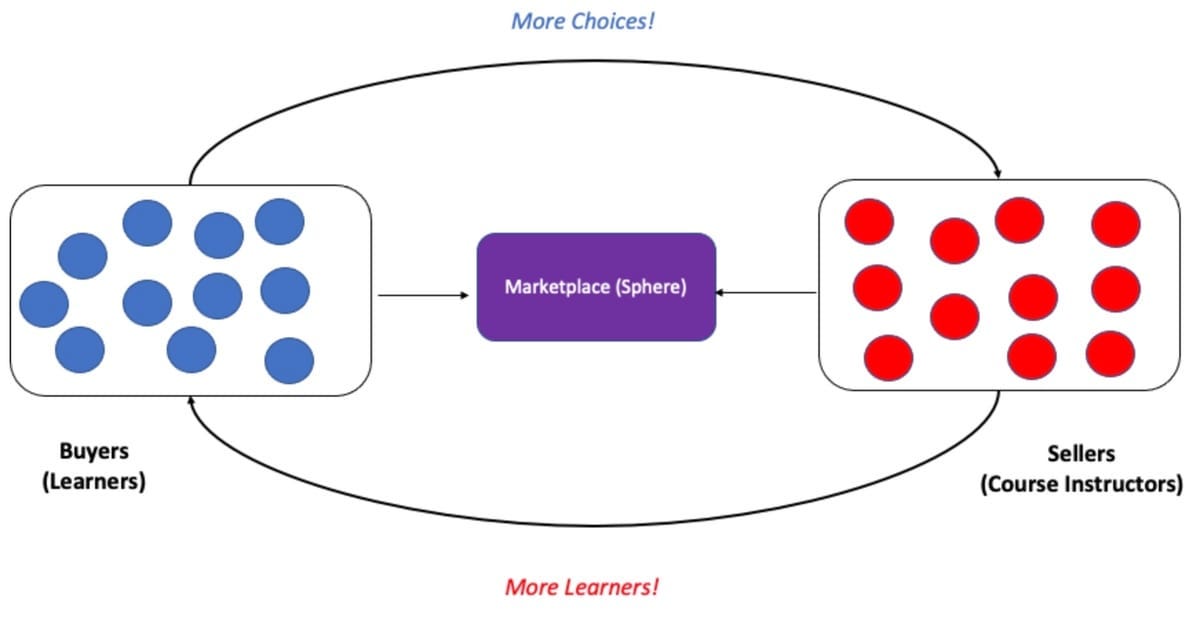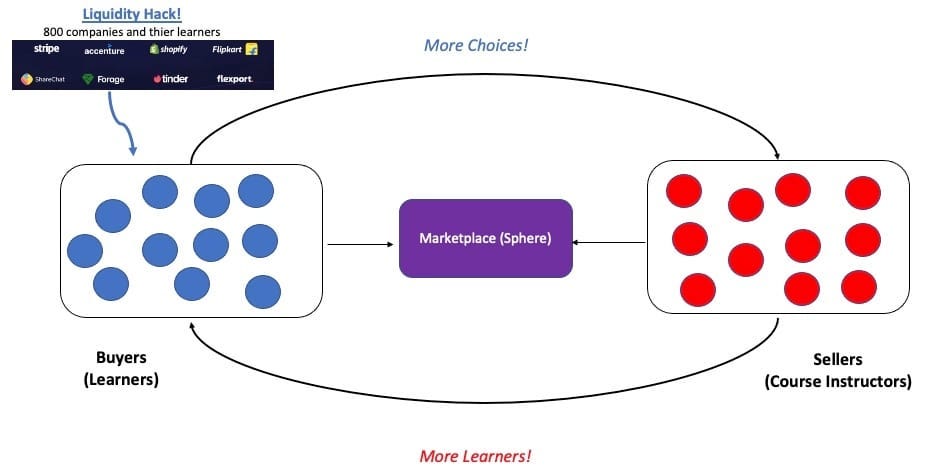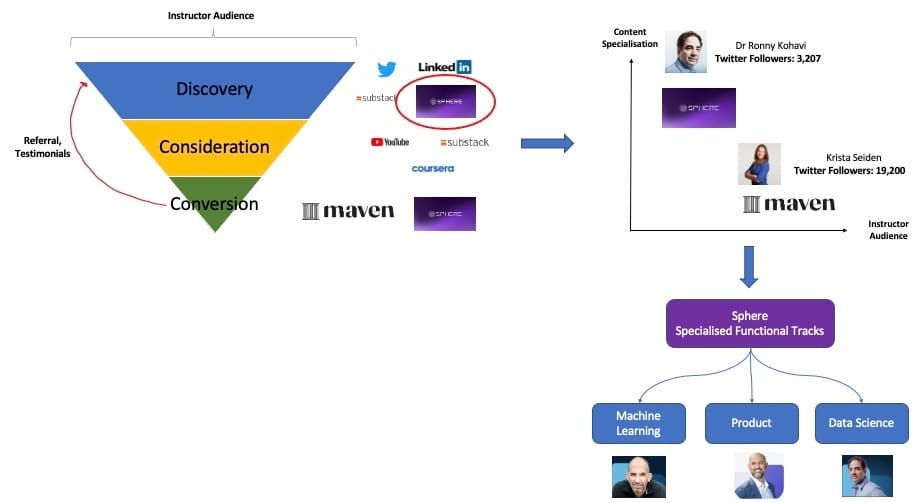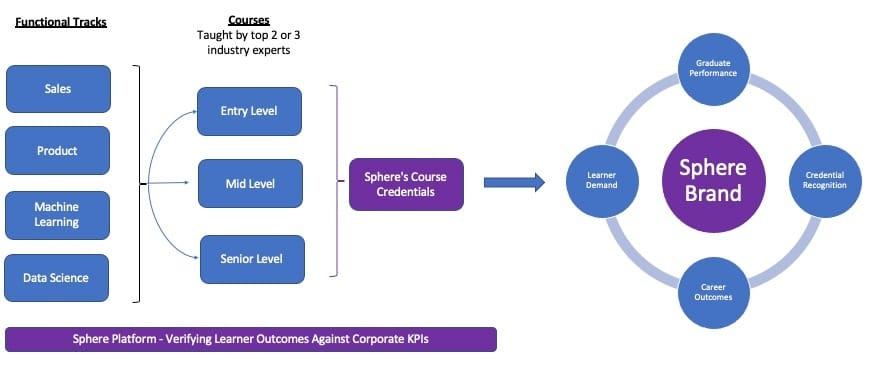How Sphere’s EdTech Marketplace Will Allow Us to Learn From the Best
And What This Could Mean for Postgraduate Education
Hi Everyone! 👋
I've been a big fan of cohort based courses. These live, online courses allow us to interact with global experts who teach us how to solve real-world problems and progress our careers. They are the professors we wished we had.
After taking 2 of Sphere's courses, I knew I had to profile them. Sphere's focus on expert instructors democratises Ivy League university content and could disrupt postgraduate education. This article will make you think twice before enrolling at Harvard.
The marketplace business model has the power to redefine industries, as Google and Tinder have shown. For those of us trying to upskill in our careers, postgraduate education is certainly an industry that requires change.
Marketplaces are powerful but challenging to start. While Tinder famously got its start by registering everyone at a USC College party, Sphere’s magic moment required more resilience. Turns out career progression is less viral than getting a date.
Founded by Nicholas Rudder and Adrian Sarstedt, Sphere provides live, cohort based courses that help learners upskill in their careers. They made the most of their entry into Y Combinator by building relationships with 800 leading technology companies like Stripe and Tinder. Such an audience allows Sphere to attract expert instructors and develop highly relevant courses. My interest in Sphere began after attending 2 of their courses. How I wish they were there earlier in my career!
Sphere has processed 1,500 learners so far, and recently raised US$4m in seed funding. Notable investors include Felicis Ventures, Y Combinator, and the founders of Go1, Lyft, Betterup and Flexport.
EdTech investors can’t afford to ignore Sphere. It is building a new kind of postgraduate university that could disrupt even Ivy League colleges and their $200,000 degrees.
How Sphere is the Expert Resource That Our Careers Need
Most of us will never forget the early days in our career. For me, there was no ‘textbook’ on how to become an investor and what I learned at university just wasn’t sufficient.
Over desperate nights and weekends in the office, I put together a collection of resources that helped me understand what we were doing. It was tough! I recall the hit-and-miss nature of the internet. For example, what was relevant information that I could use in my analysis? I had to get it right, mistakes would only highlight my inexperience
Upskilling is a high-stakes game. Our reputations are on the line. We need real-world insights, from industry experts.
Eventually, I was included in the team and had the privilege of learning from some of the best investors in the country. My experience isn’t unique. With most major businesses admitting to a skills gap in their workforce, upskilling is something most of us will go through in our careers.
Sphere is building a platform where industry experts teach courses to help you find the answers you need at every step in your career.
Upskilling redefined: From trial-by-error searching to 1 portal to learn from industry experts
Sphere uses the cohort based learning format discussed in a previous article. These are live, online courses where learners progress through the material in ‘cohorts’ or learning groups. While they are expensive (US$750-5,000), they deliver strong learning outcomes and the opportunity to build relationships with like-minded peers. Exactly what we need!
If Sphere is successful, it will redefine post graduate education.
A Business Model With the Power to Create a New Kind of University
Like most learners, I couldn’t afford Ivy League schools like Stanford University. Yet this was the level of expertise I needed to succeed in my role.
Sphere is building a new kind of learning institution, where learners can be taught the skills they need from industry experts. Its challenge is the high cost of building the large number of courses required to meet all their different needs.
To solve this, Sphere is using a business model used by iconic companies like Google and Uber. A marketplace connects buyers and sellers in exchange for a fee. In Sphere’s case, the ‘buyers’ are the learners and the ‘sellers’ are the expert instructors.
Marketplaces are powered by network effects that make them more valuable as more people use them. For example,
More learners make Sphere’s marketplace more valuable to expert instructors.
More instructors increase Sphere’s value to learners.
The result is a virtuous cycle where learners and instructors grow the marketplace themselves! This is why network effects are estimated to account for 70% of the value created in technology businesses.
Marketplace network effects: More buyers will attract more sellers which will attract more buyers etc.
“Network effects have accounted for approximately 70% of the value creation in tech.”
James Currier, Founder of NFX
There is a catch. Marketplaces are extremely difficult to start. Which side comes first – learners or instructors? This is the ‘chicken and egg’ dynamic for marketplaces.
It also illustrates an important marketplace concept called liquidity, or how efficiently the marketplace can connect buyers and sellers. Marketplaces need to build a critical mass of buyers and sellers to kickstart their network effects. Failure to achieve sufficient liquidity is the reason most marketplaces fail.
“Liquidity isn’t the most important thing… it’s the only thing.”
Simon Rothman, Partner at Greylock Partners
In the past, startups like Uber spent huge amounts of capital subsidizing both sides (riders and drivers) to achieve this critical mass. Today, startups don’t have this luxury. They need a clever ‘liquidity hack’. For Sphere, discovering this has been a combination of the journey and resilience of the founders.
Nick’s Journey and the Need for a Better Postgraduate Experience
I recall my volunteer work for a charity during university. We were dropped off in the middle of the city and told to fill a big tin can with donations by the end of the day. It was exhausting work but taught me resilience as I persevered through hundreds of rejections for the elusive ‘yes’.
Nick took this to a whole other level by co-founding a social impact startup (Pledger) that facilitated thousands of dollars in transactions between corporate donors and charities. It was his first taste of entrepreneurship.
After university, he worked in prestigious roles in consulting and investment banking. These are roles with steep learning curves. New hires need to build their expertise to advise clients on solving real problems.
Nick’s problem – he wasn’t satisfied on just advising businesses, he wanted to run one. He believed an MBA program would give him the skills to build a startup and enrolled in The London Business School.
Nick’s London Business School introduction page
The experience was underwhelming. Nick felt that many Professors lacked the relevant industry experience and that academic ’strategy 101’ courses weren’t what the next generation of builders needed. There was remarkably little content on contemporary topics like technology and entrepreneurship skills that could be applied in real life.
COVID added insult to injury when many universities continued to charge full fees for hastily organised Zoom classes.
Nick knew there had to be a better way. He reached out to Adrian Sarstedt whom he had known for years. With a software engineering and machine learning background, Nick described Adrian as a ‘technical guru’.
Together, they co-founded Sphere (initially called ScholarSite) and set out to build a better postgraduate experience.
How Sphere Got Into Y Combinator Through the Power of Focus
Sphere was founded in early 2021 as the creator economy was taking off. Initially, the idea was to build online profiles for professors and industry experts that showcased their experience and research. They would earn revenue by charging them for ‘creator tools’ such as the technology tools to run online courses. Through hustling and reaching out to their contacts, the founders amassed 4,000 expert profiles.
Encouraged by their progress, the founders pitched their ‘creator tools’ idea to Y Combinator. The Y Combinator accelerator program has produced industry giants like Airbnb. Their entry standards are demanding and they don’t mince their words.
Instead of a business that could redefine postgraduate education, Y Combinator saw Sphere as a social media startup. Only a few of Sphere’s expert profiles had an audience which meant that the likelihood of material monetization was slim. Instead of profiles, Y Combinator wanted paying customers.
Nick and Adrian were down but far from out. They took another look at what they had built and zeroed in on what was working. They focused on their best experts and consolidated their ‘creator tools’ around one thing – running cohort based courses.
One of these experts is Steve Tadelis, a professor at UC Berkeley with experience at eBay and Amazon. The founders worked with Steve to produce the best course they could.
Focusing on what is working – Launching Steve Tadelis’s popular cohort based course
It worked! Steve’s success helped them launch other courses and got them into Y Combinator.
How Sphere is Unlocking Content From the Best People In Their Industries
Y Combinator pioneered the accelerator concept in 2005. It has since built close contacts with well-known companies like Stripe and Flexport. For example, Stripes co-founders were Y Combinator alumni.
Nick and Adrian made the most of the Y Combinator’s cult status in the technology industry. They built a presence in the Learning and Development (L&D) departments in 800 technology companies which gave them access to thousands of learners. This was the ‘liquidity hack’ they needed to kickstart their marketplace.
Sphere’s marketplace liquidity hack – Learning and Development departments in 800 technology companies
This is a great example of how a marketplace’s liquidity hack can define its strategy.
As my previous article discussed, Maven relies on its popular instructors to attract learners to its marketplace. In contrast, Sphere can provide prospective instructors with a ready audience in leading technology companies. These instructors earn 80% of the course earnings and build an audience in companies that could advance their careers.
Sphere is an attractive proposition for instructors who have focused on being the best in their respective fields.
Not bad for a few hours of teaching!
The result is a marketplace being built around expert, specialised content tailored to corporate L&D needs. You can see this in how Sphere is organising its courses into ‘functional tracks’ such as Data Science and Machine Learning.
Sphere’s corporate relationships attracts specialised, expert instructors.
An Efficient Distribution Strategy Designed Around Their Customers' Needs
With around 80% of learners being sponsored by their employers, Sphere works closely with its corporate customers to understand their upskilling needs. Instructors then design their courses around these needs. As a result, learners are attracted to the highly relevant content. Think about it this way – wouldn’t you want to learn something that Apple thinks is important?
Additionally, Sphere uses a product-led sales distribution strategy. Professionals sign up to courses on a self-serve basis through the Sphere platform (i.e. a product-led model) and once they reach 12-15 learners in a company, Sphere will approach the L&D decision makers for a team/enterprise contract. These contracts promote Sphere’s courses to employees within the company.
The combination of high-priced courses ($1000 per student average) and a product-led sales distribution strategy (shorter sales cycles and lower cost of customer acquisition) results in strong unit economics.
Unlike many EdTech providers, their courses are profitable from the first cohort. Their average cohort size of 100 learners is more than double the amount they need to break-even. Subsequent cohorts are even more profitable as most of the course design work has already been done.
How Sphere Is Building Its Competitive Advantage and Disrupting Postgraduate Education
Sphere has found a way to kickstart its marketplace. How can it build a competitive advantage to avoid the brutal competition we’ve seen in ride-share markets with Uber and Lyft? By becoming a brand and building industry-recognised credentials into their courses.
Longer term, the value of cohort based businesses will depend on their brands, not just content. Course credentials from Sphere could carry the same weight as Ivy League postgraduate degrees costing $200,000.
Sounds far-fetched? Think about the purpose of a degree certificate. Employees want their degrees to advance their careers. A degree credential can be unbundled into the ‘signals’ they provide to prospective employers. Employers want to know:
What you learned (Domain Expertise): Are the skills taught relevant to the job or promotion the employee is applying for? Sphere’s courses are designed around specific corporate objectives and taught by leading experts in their fields.
How you learned (Conscientiousness): How have you shown initiative, can you work in a team? Sphere’s live, cohort based format is well-suited to evaluate this.
How capable have graduates been (General Horsepower): How have graduates performed in their roles? Sphere is working with their corporate clients to develop benchmarks for learner performance during and after the course.
Unbundling degree credentials
For example, the Sales Course was designed around specific corporate KPIs such as conversions. Sphere worked with their corporate clients to measure learner performance during the course as well as how the learner’s conversions improved after the course.
These analytics and performance benchmarking will be specific to Sphere’s platform. Over time, they allow Sphere to build a brand with a track record of successful learner outcomes.
Nick and Adrian have an ambitious vision to build the world’s ‘largest decentralised corporate university’. Sphere will offer courses taught by leading experts across multiple job functions and levels of seniority.
Sphere’s Corporate University – The ‘Harvard’ of cohort based courses?
This means you could get unstuck in your career by enrolling with Sphere instead of desperately searching on the internet. If you knew that Sphere’s courses could get you that promotion, would you enroll in Harvard? That’s the power of what Sphere is building.











